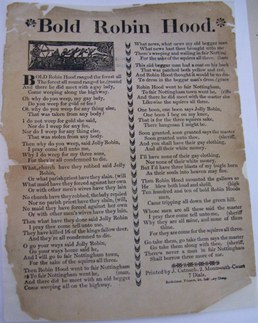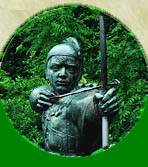|
ROBIN HOOD RESCUING THREE SQUIRES
No. 140, VERSION B
From The English and Scottish Popular Ballads
by Francis James
Child, 1888.
AND
* BOLD ROBIN HOOD *
From The Osborne Collection of Early Children's Books,
The Toronto Public Library
Introduction
 This
is one of Robin Hood's most famous exploits. Most Robin Hood movies and television shows feature a scene where the outlaw prevents an unjust hanging. The men Robin rescues are called widow's sons in another version of the ballad. It is also is similar to the ballad where Robin Hood rescues Will Stutely. It is one of many stories
where Robin uses a disguise to trick his enemies. This
is one of Robin Hood's most famous exploits. Most Robin Hood movies and television shows feature a scene where the outlaw prevents an unjust hanging. The men Robin rescues are called widow's sons in another version of the ballad. It is also is similar to the ballad where Robin Hood rescues Will Stutely. It is one of many stories
where Robin uses a disguise to trick his enemies.
This isn't the only ballad where the Sheriff of Nottingham meets a bad end. In the much earlier ballad, A Gest of Robyn Hode, Robin cuts off the sheriff's head. In Robin Hood and Guy of Gisborne, Little John shoots the sheriff in the back.
When Howard Pyle adapted the Robin Hood ballads into his classic 1883 children's novel The Merry Adventures of Robin Hood, he linked this ballad with the Gisborne ballad and made Little John the one to save the three young men while Robin was busy dealing with Guy of Gisbourne. Click here to read Howard Pyle's version of the story.
This ballad has many different names and versions. Directly below this introduction is the second version to appear in Francis Child's great 19th century ballad collection. After Child's B-version, there's an alternative version using text of the 1830 broadside titled Bold Robin Hood available at the Toronto Public Library's Osborne Collection of Early Children's Books. This version closely resembles version C printed in Child's collection. The image is a photo of the Osborne copy.
Robin Hood Rescuing Three Squires, No. 140, Version B
also known as
Robin Hood Rescuing the Widow's Three Sons
1
There are twelve months in all the year,
But the merriest month in all the year
Is
the merry month of May.
2
Now Robin Hood is to Nottingham gone,
With
a link a down and a day,
And there he met a silly old woman,
3
'What news? what news, thou silly old woman?
What
news hast thou for me?
Said she, There's three squires in Nottingham
To-day
is condemned to die.
4
'O have they parishes burnt?' he said,
'Or
have they ministers slain?
Or have they robbed any virgin,
Nor
with other men's wives have lain?'
5
'They have no parishes burnt, good sir,
Nor
yet have ministers slain,
Nor have they robbed any virgin,
Nor
with other men's wives have lain.'
6
'O what have they done?' said bold Robin
'I pray
thee tell to me:'
'It's for slaying of the king's fallow deer,
Bearing
their long bows with thee.'
7
'Dost thou not mind, old woman,' he said,
'Since
thou made me sup and dine?
By the truth of my body,' quoth bold Robin
'You
could not tell it in better time.'
8
Now Robin Hood is to Nottingham gone,
With
a link a down and a day,
And there he met with a silly old palmer,
Was
walking along the highway.
9
'What news? what news, thou silly old man?'
What
news, I do thee pray?'
Said he, Three squires in Nottingham town
Are
condemned to die this day.
10
'Come change thy apparel with me, old man,
Come
change thy apparel for mine;
Here is forty shillings in good silver,
Go
drink it in beer or wine.'
11 'O
thine apparel is good,' he said,
'And
mine is ragged and torn;
Whereever you go, wherever you ride,
Laugh
neer an old man to scorn.'
12
'Come change thy apparel with me, old churl,
Come
change thy apparel with mine;
Here are twenty pieces of good broad gold,
Go
feast thy brethren with wine.'
13 Then
he put on the old man's hat,
It
stood full high on the crown:
'The first bold bargain that I come at,
It
shall make thee come down.'
14 Then
he put on the old man's cloak,
Was
patchd black, blew and red;
He thought no shame all the day long
To
wear the bags of bread.
15 Then
he put on the old man's breeks,
Was
patchd from ballup to side;
'By the truth of my body,' bold Robin can say,
'This
man lovd little pride.'
16 Then
he put on the old man's hose,
Were
patchd from knee to wrist;
'By the truth of my body,' said bold Robin
'I'd
laugh if I had any list.'
17 Then
he put on the old man's shoes,
Were
patchd both beneath and aboon;
Then Robin Hood swore a solemn oath,
It's
good habit that makes a man.
18 Now
Robin Hood is to Nottingham gone,
With
a link a down and a down,
And there he met with the proud sheriff,
Was
walking along the town.
19 'O
save, O save, O sheriff,' he said,
'O
save, and you may see!
And what will you give to a silly old man
To-day
will your hangman be?'
20 'Some
suits, some suits,' the sheriff he said,
'Some
suits, I'll give to thee;
Some suits, some suits, and pence thirteen
To-day's
a hangman's fee.'
21 Then
Robin he turns him round about,
And
jumps from stock to stone;
'By the truth of my body,' the sheriff he
'That's
well jumpt, thou nimble old man.'
22 'I
was neer a hangman in all my life,
Nor
yet intends to trade;
But curst be he,' said bold Robin,
'That
first a hangman was made.
23 'I've
a bag for meal, and a bag for malt,
And
a bag for barley and corn;
A bag
for bread, and a bag for beef.
And
a bag for my little small horn.
24 'I
have a horn in my pocket,
I
got it from Robin Hood,
And still when I set it to my mouth,
For
thee it blows little good.'
25 'O
wind thy horn, thou proud fellow,
I wish that thou give such a blast
Till
both thy eyes fall out.'
26 The
first loud blast that he did blow,
He
blew both loud and shrill;
A hundred and fifty of Robin Hood's men
Came
riding over the hill.
27 The
next loud blast that he did give,
He
blew both loud and amain,
And quickly sixty of Robin Hood's men
Came
shining over the plain.
28 'O
who are you,' the sheriff he said,
'Come
tripping over the lee?'
'The 're my attendants,' brave Robin did say,
'They'll
pay a visit to thee.'
29 They
took the gallows from the slack,
They hangd the proud sheriff on that,
Releasd
their own three men.'
A shorter version of the tale above appears in a broadside edition at the Toronto Public Library's magnificent Osborne Collection. The collection dates their edition from 1830. "Printed by J. Catnach, 2, Monmouth-Court, 7 Dials." The text closely resembles that of version C from Child's collection, although with some differences. In Child's version C, Robin's question in the final lines of the second stanza and the widow's response in the third stanza are more specific and explicit.
I note in this version that there are at least "ten hundred and ten" members of Robin`s outlaw band, among the largest groupings of the Merry Men in the legend's history.
I have retained most features of the original in the Osborne Collection, such as the inconsistent spelling of beggar and a few typos, but have not kept its method for when lines run over the available space. (In a few places, the final word of a line would appear after a bracket on the line above or below where it actually belonged.)
BOLD Robin Hood ranged the forest all round
The forest all round ranged he,
And there he did meet with a gay lady,
Come weeping along the highway.
Oh why do you weep, my gay lady,
Do you weep for gold or fee?
Oh why do you weep for any thing else,
That was taken from any body?
I do not weep for gold she said,
Nor do I weep for any fee,
Nor do I weep for any thing else,
That was stolen from any body.
Then why do you weep, said Jolly Robin,
I pray come tell unto me,
Why I do weep for my three sons,
For they're all condemned to die.
What church have they robbed said Jolly Robin,
Or what parish priest have they slain.
What maid have they forced against her own will
Or with other men's wives have they lain
No church have they robbed, the lady replied
Nor no parish priest have they slain,
No maid have they forced against her own will,
Or with other men's wives have they lain.
Then what have they done said Jolly Robin
I pray come tell unto me,
They have killed 16 of the kings fallow deer,
And they're all condemned to die.
O go your ways said Jolly Robin,
Go your ways home said he,
And I will go to fair Nottingham town,
For the sake of the squires all three.
Then Robin Hood went to fair Nottingham
To fair Nottingham went he,
And there did he meet with an old begger man,
Come weeping all on tbe highway.
What news, what news my old begger man
What news hast thou brought unto me
There's weeping and wailing in fair Nottingham
For the sake of the squires all three.
The old beggar man had a coat on his back
That was patched both yellow and red.
And Robin Hood thought it would be no disgrace
To dress in the beggar man's dress.
Robin Hood went to fair Nottingham,
To fair Nottingham town went he,
And there he did meet with the master sheriffs
Likewise the squires all three.
One boon, one boon says Jolly Robin,
One boon I beg on my knee,
That is for the three squires sake,
There hangman I might be.
Soon granted, soon granted says the master sheriff,
Soon granted unto thee,
And you shall have their gay clothing,
And all their white money.
I`ll have none of their gay clothing,
Nor none of their white money,
But I`d have three blasts of my bugle horn
As their souls into heaven may flee.
Then Robin Hood mounted the gallows so high
He blew both loud and shrill,
Ten hundred and ten of Bold Robin Hoods men,
Came tripping all down the green hill.
Whose men are all these said the master sheriff,
I pray thee come tell unto me,
Why they are all mine, and none of them thine.
For they are come for the squires all three.
Go take them, go take them says the master sheriff,
Go take them along with thee,
There's never a man in fair Nottingham
Shall borrow three more of me.
Click here to see a larger picture of the original broadside held in the Osborne Collection.
NEXT: Robin Hood and the Bishop of Hereford
ALSO: Read Howard Pyle's adaptation in The Merry Adventures of Robin Hood - he combined this ballad with Robin Hood and Guy of Gisborne.
|

